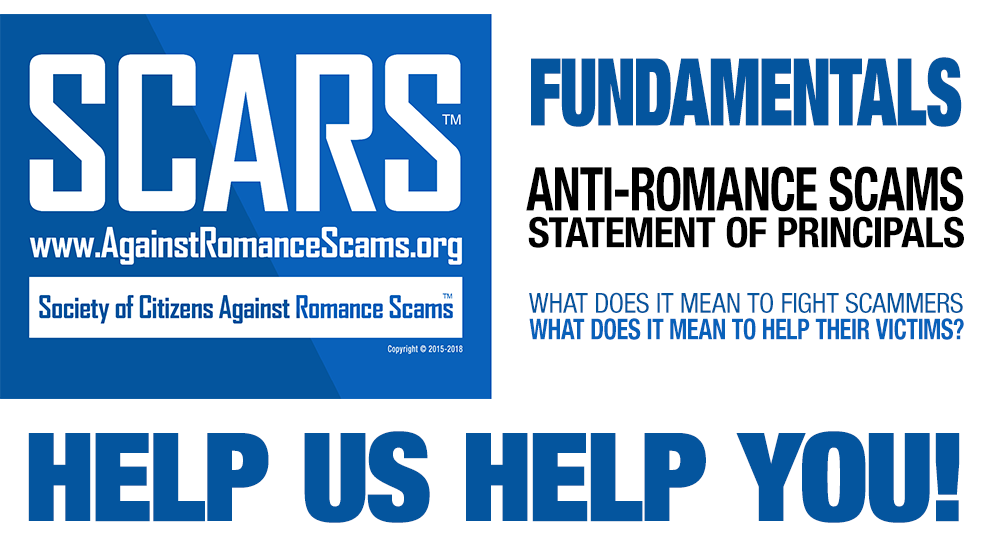SCARS™ Insight: Why Do We Fight Each Other? Call To Action!
What Is Missing Is An Anti-Romance Scams Statement of Principals – But What Does That Mean?
The SCARS![]() Management Team has had a revelation recently about the fight against scammers.
Management Team has had a revelation recently about the fight against scammers.
Almost no one is fighting the same fight.
Why is that? How could that be?
We all see the same enemy but anti-scam groups spend as much time fighting each other as they do helping victims – at least this is true of groups that are not SCARS Members.
We have seen that similar problems exist in other areas of victim and recovery support, and one of the main reasons is (it seems) is the lack of agreed-upon fundamentals. SCARS has a well defined thorough set in its Code of Conduct![]() and through the international NOVA Standard for Victim’s Assistance
and through the international NOVA Standard for Victim’s Assistance![]() , but SCARS is the ONLY anti-scam organization that adheres to these (of course SCARS is the only real anti-scam organization period).
, but SCARS is the ONLY anti-scam organization that adheres to these (of course SCARS is the only real anti-scam organization period).
We think that it would be a good idea to create a set of First Principals that all anti-scam groups, individuals, advocates, and organizations can agree upon. Then at least victims would understand what everyone stands for. Or so goes the theory.
SCARS would like to ask each member of this group to suggest what you think these fundamentals are. Add them as comments to this document so they can be reviewed and explored. This will help you solve some of the fundamental problems that keep the anti-scam community divided and advance the state of anti-scam efforts in the process.
What do you think are these fundamentals or first principals. Add as many as you want, everyone has a voice and say in this. Share your thoughts now while it can make a difference. BUT please be both thoughtful and adult – childish hate is not helpful. Remember, that this is from the perspective of what the community of anti-scammers can work towards.
Please help!
Thank you
Society of Citizens Against Romance Scams Inc.![]()

RSN™ Team
a division of SCARS™
Miami Florida U.S.A.
END
– – –
Tell us about your experiences with Romance Scammers in our Scams Discussion Forum on Facebook
– – –
FAQ: How Do You Properly Report Scammers?
It is essential that law enforcement knows about scams & scammers, even though there is nothing (in most cases) that they can do.
Always report scams involving money lost or where you received money to:
- Local Police – ask them to take an “informational” police report – say you need it for your insurance
- Your National Police or FBI (www.IC3.gov
 )
) - The Scars Worldwide Reporting Network HERE
 or on www.Anyscam.com
or on www.Anyscam.com
This helps your government understand the problem, and allows law enforcement to add scammers on watch lists worldwide.
– – –
Visit our NEW Main SCARS™ News & Information Facebook page for much more information about scams and online crime: www.facebook.com/SCARS.News.And.Information![]()
To learn more about SCARS visit www.AgainstScams.org![]()
Please be sure to report all scammers HERE or on www.Anyscam.com
or on www.Anyscam.com
All original content is Copyright © 1991 – 2018 SCARS All Rights Reserved Worldwide & Webwide – RSN/Romance Scams Now & SCARS/Society of Citizens Against Romance Scams are all trademarks of Society of Citizens Against Romance Scams Inc.





Please Leave A Comment - Tell Us What You Think About This!